最新高中英语情景交际经典习题(含答案)
- 格式:doc
- 大小:72.50 KB
- 文档页数:10
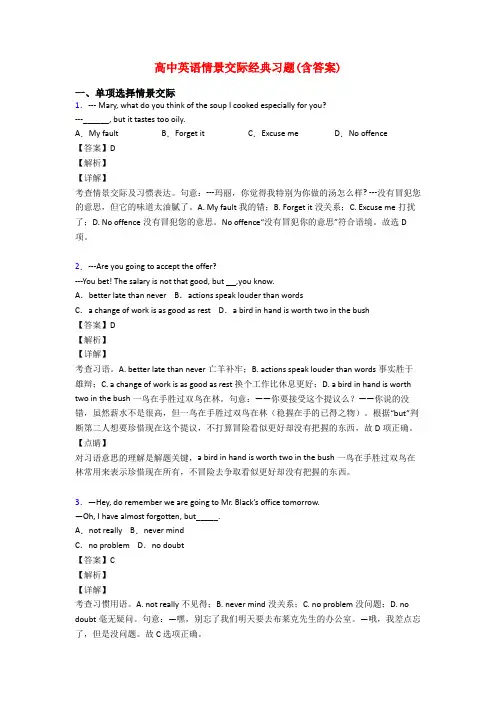
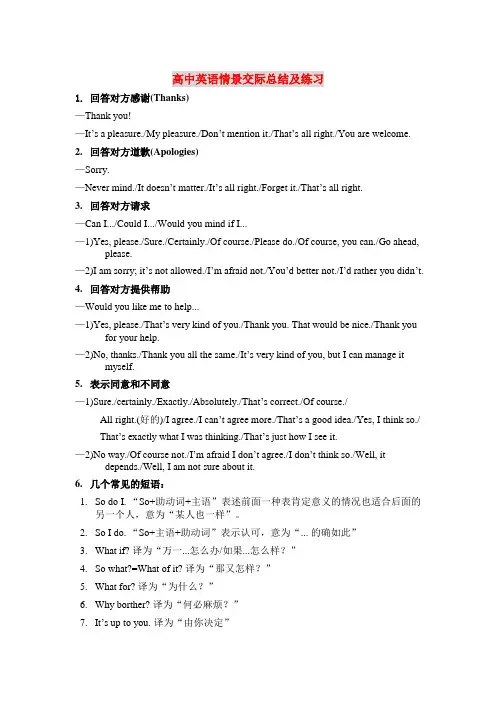
高中英语情景交际总结及练习1.回答对方感谢(Thanks)—Thank you!—It’s a pleasure./My pleasure./Don’t mention it./That’s all right./You are welcome. 2.回答对方道歉(Apologies)—Sorry.—Never mind./It doesn’t matter./It’s all right./Forget it./That’s all right.3.回答对方请求—Can I.../Could I.../Would you mind if I...—1)Yes, please./Sure./Certainly./Of course./Please do./Of course, you can./Go ahead, please.—2)I am sorry; it’s not allowed./I’m afraid not./You’d better not./I’d rather you didn’t.4.回答对方提供帮助—Would you like me to help...—1)Yes, please./That’s very kind of you./Thank you. That would be nice./Thank you for your help.—2)No, thanks./Thank you all the same./It’s very kind of you, but I can manage it myself.5.表示同意和不同意—1)Sure./certainly./Exactly./Absolutely./That’s correct./Of course./All right.(好的)/I agree./I can’t agree more./That’s a good idea./Yes, I think so./ That’s exactly what I was thinking./That’s just how I see it.—2)No way./Of course not./I’m afraid I don’t agree./I don’t think so./Well, it depends./Well, I am not sure about it.6.几个常见的短语:1.So do I. “So+助动词+主语”表述前面一种表肯定意义的情况也适合后面的另一个人,意为“某人也一样”。
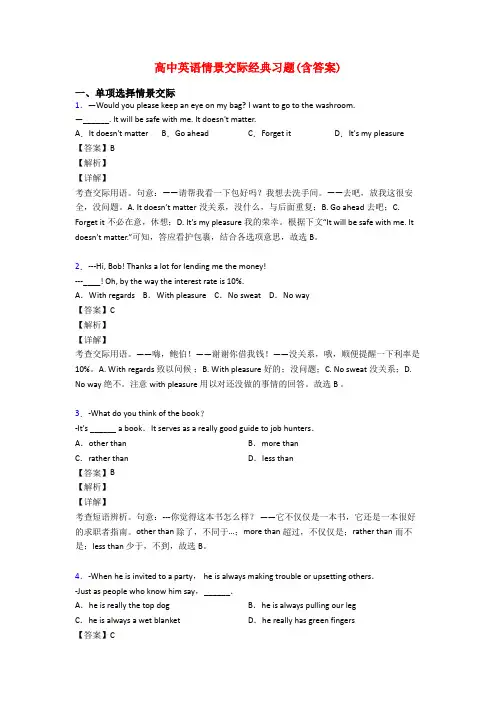
高中英语情景交际经典习题(含答案)一、单项选择情景交际1.—Would you please keep an eye on my bag? I want to go to the washroom.—______. It will be safe with me. It doesn't matter.A.It doesn't matter B.Go ahead C.Forget it D.It's my pleasure 【答案】B【解析】【详解】考查交际用语。
句意:——请帮我看一下包好吗?我想去洗手间。
——去吧,放我这很安全,没问题。
A. It doesn’t matter没关系,没什么,与后面重复;B. Go ahead去吧;C. Forget it不必在意,休想;D. It’s my pleasure我的荣幸。
根据下文“It will be safe with me. It doesn’t matter.”可知,答应看护包裹,结合各选项意思,故选B。
2.---Hi, Bob! Thanks a lot for lending me the money!---____! Oh, by the way the interest rate is 10%.A.With regards B.With pleasure C.No sweat D.No way【答案】C【解析】【详解】考查交际用语。
——嗨,鲍伯!——谢谢你借我钱!——没关系,哦,顺便提醒一下利率是10%。
A. With regards致以问候;B. With pleasure好的;没问题;C. No sweat没关系;D. No way绝不。
注意with pleasure 用以对还没做的事情的回答。
故选B 。
3.-What do you think of the book?-It's ______ a book.It serves as a really good guide to job hunters.A.other than B.more thanC.rather than D.less than【答案】B【解析】【详解】考查短语辨析。
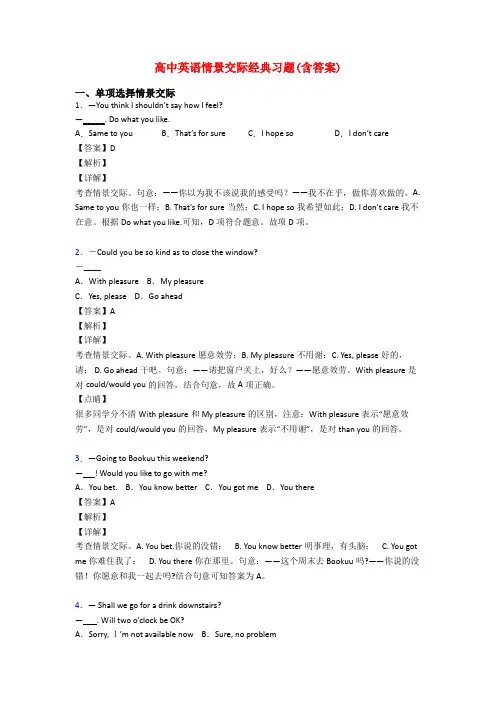
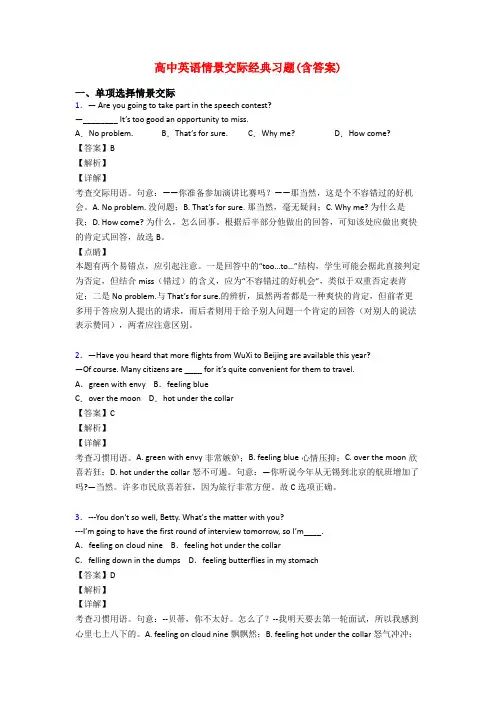
高中英语情景交际经典习题(含答案)一、单项选择情景交际1.— Are you going to take part in the speech contest?—________ It’s too good an opportunity to miss.A.No problem. B.That’s for sure.C.Why me? D.How come?【答案】B【解析】【详解】考查交际用语。
句意:——你准备参加演讲比赛吗?——那当然,这是个不容错过的好机会。
A. No problem. 没问题;B. That’s for sure. 那当然,毫无疑问;C. Why me? 为什么是我;D. How come? 为什么,怎么回事。
根据后半部分他做出的回答,可知该处应做出爽快的肯定式回答,故选B。
【点睛】本题有两个易错点,应引起注意。
一是回答中的“too…to…”结构,学生可能会据此直接判定为否定,但结合miss(错过)的含义,应为“不容错过的好机会”,类似于双重否定表肯定;二是No problem.与That’s for sure.的辨析,虽然两者都是一种爽快的肯定,但前者更多用于答应别人提出的请求,而后者则用于给予别人问题一个肯定的回答(对别人的说法表示赞同),两者应注意区别。
2.—Have you heard that more flights from WuXi to Beijing are available this year?—Of course. Many citizens are ____ for it’s quite convenient for them to travel.A.green with envy B.feeling blueC.over the moon D.hot under the collar【答案】C【解析】【详解】考查习惯用语。
A. green with envy非常嫉妒;B. feeling blue心情压抑;C. over the moon欣喜若狂;D. hot under the collar怒不可遏。
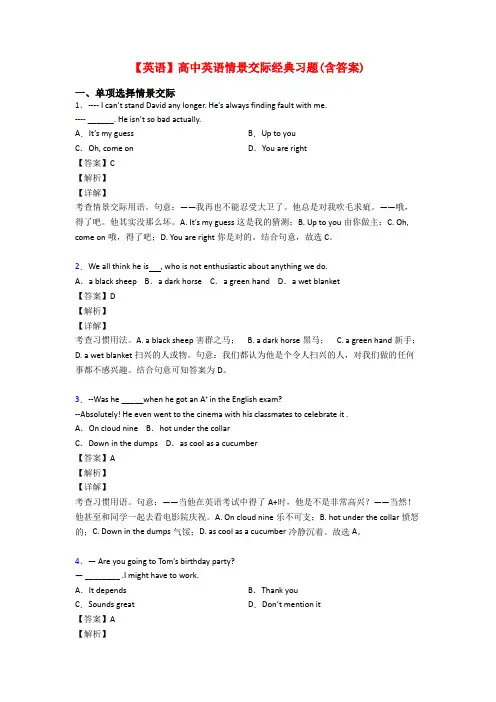
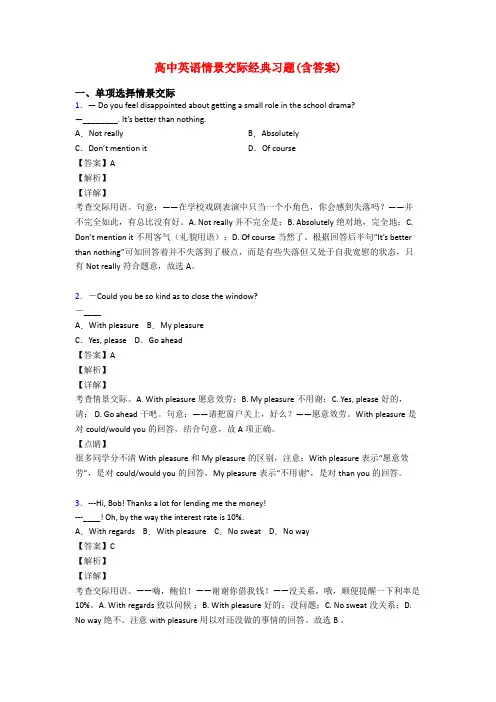
高中英语情景交际经典习题(含答案)一、单项选择情景交际1.— Do you feel disappointed about getting a small role in the school drama?—________. It’s better than nothing.A.Not really B.AbsolutelyC.Don’t mention it D.Of course【答案】A【解析】【详解】考查交际用语。
句意:——在学校戏剧表演中只当一个小角色,你会感到失落吗?——并不完全如此,有总比没有好。
A. Not really并不完全是;B. Absolutely绝对地,完全地;C. Don’t mention it不用客气(礼貌用语);D. Of course当然了。
根据回答后半句“It’s better than nothing”可知回答着并不失落到了极点,而是有些失落但又处于自我宽慰的状态,只有Not really符合题意,故选A。
2.-Could you be so kind as to close the window?-____A.With pleasure B.My pleasureC.Yes, please D.Go ahead【答案】A【解析】【详解】考查情景交际。
A. With pleasure愿意效劳;B. My pleasure不用谢;C. Yes, please好的,请; D. Go ahead干吧。
句意:——请把窗户关上,好么?——愿意效劳。
With pleasure是对could/would you的回答,结合句意,故A项正确。
【点睛】很多同学分不清With pleasure和My pleasure的区别,注意:With pleasure表示“愿意效劳”,是对could/would you的回答,My pleasure表示“不用谢”,是对than you的回答。
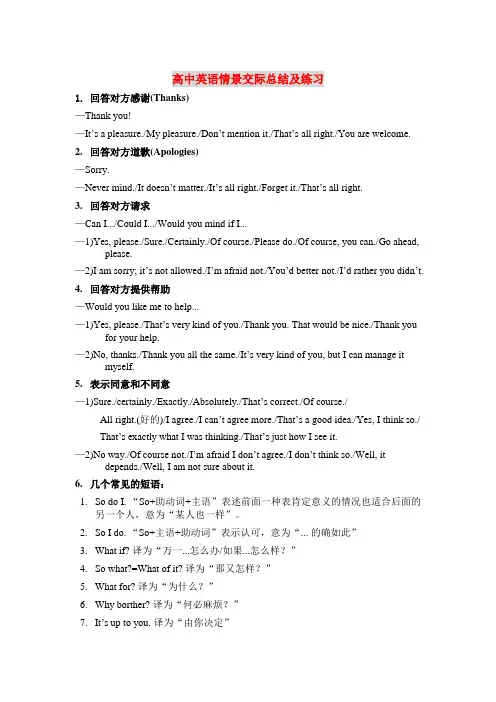
高中英语情景交际总结及练习1.回答对方感谢(Thanks)—Thank you!—It’s a pleasure./My pleasure./Don’t mention it./That’s all right./You are welcome. 2.回答对方道歉(Apologies)—Sorry.—Never mind./It doesn’t matter./It’s all right./Forget it./That’s all right.3.回答对方请求—Can I.../Could I.../Would you mind if I...—1)Yes, please./Sure./Certainly./Of course./Please do./Of course, you can./Go ahead, please.—2)I am sorry; it’s not allowed./I’m afraid not./You’d better not./I’d rather you didn’t.4.回答对方提供帮助—Would you like me to help...—1)Yes, please./That’s very kind of you./Thank you. That would be nice./Thank you for your help.—2)No, thanks./Thank you all the same./It’s very kind of you, but I can manage it myself.5.表示同意和不同意—1)Sure./certainly./Exactly./Absolutely./That’s correct./Of course./All right.(好的)/I agree./I can’t agree more./That’s a good idea./Yes, I think so./ That’s exactly what I was thinking./That’s just how I see it.—2)No way./Of course not./I’m afraid I don’t agree./I don’t think so./Well, it depends./Well, I am not sure about it.6.几个常见的短语:1.So do I. “So+助动词+主语”表述前面一种表肯定意义的情况也适合后面的另一个人,意为“某人也一样”。
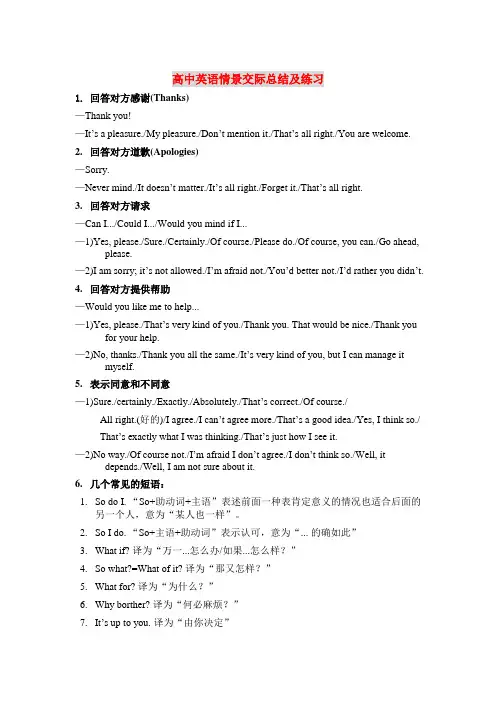
高中英语情景交际总结及练习1.回答对方感谢(Thanks)—Thank you!—It’s a pleasure./My pleasure./Don’t mention it./That’s all right./You are welcome. 2.回答对方道歉(Apologies)—Sorry.—Never mind./It doesn’t matter./It’s all right./Forget it./That’s all right.3.回答对方请求—Can I.../Could I.../Would you mind if I...—1)Yes, please./Sure./Certainly./Of course./Please do./Of course, you can./Go ahead, please.—2)I am sorry; it’s not allowed./I’m afraid not./You’d better not./I’d rather you didn’t.4.回答对方提供帮助—Would you like me to help...—1)Yes, please./That’s very kind of you./Thank you. That would be nice./Thank you for your help.—2)No, thanks./Thank you all the same./It’s very kind of you, but I can manage it myself.5.表示同意和不同意—1)Sure./certainly./Exactly./Absolutely./That’s correct./Of course./All right.(好的)/I agree./I can’t agree more./That’s a good idea./Yes, I think so./ That’s exactly what I was thinking./That’s just how I see it.—2)No way./Of course not./I’m afraid I don’t agree./I don’t think so./Well, it depends./Well, I am not sure about it.6.几个常见的短语:1.So do I. “So+助动词+主语”表述前面一种表肯定意义的情况也适合后面的另一个人,意为“某人也一样”。
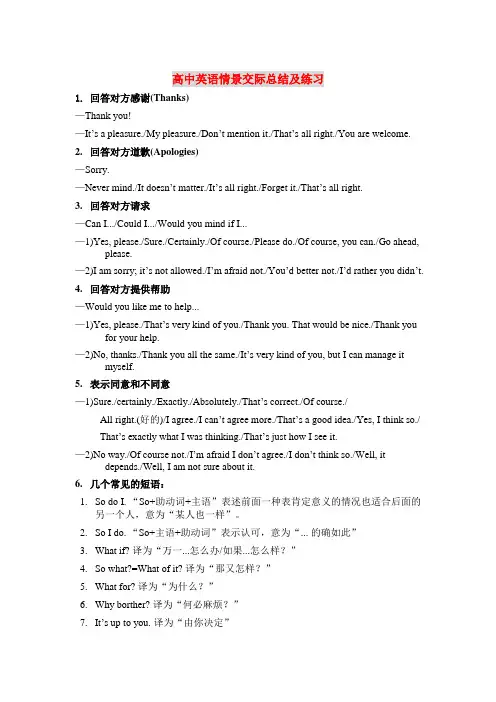
高中英语情景交际总结及练习1.回答对方感谢(Thanks)—Thank you!—It’s a pleasure./My pleasure./Don’t mention it./That’s all right./You are welcome. 2.回答对方道歉(Apologies)—Sorry.—Never mind./It doesn’t matter./It’s all right./Forget it./That’s all right.3.回答对方请求—Can I.../Could I.../Would you mind if I...—1)Yes, please./Sure./Certainly./Of course./Please do./Of course, you can./Go ahead, please.—2)I am sorry; it’s not allowed./I’m afraid not./You’d better not./I’d rather you didn’t.4.回答对方提供帮助—Would you like me to help...—1)Yes, please./That’s very kind of you./Thank you. That would be nice./Thank you for your help.—2)No, thanks./Thank you all the same./It’s very kind of you, but I can manage it myself.5.表示同意和不同意—1)Sure./certainly./Exactly./Absolutely./That’s correct./Of course./All right.(好的)/I agree./I can’t agree more./That’s a good idea./Yes, I think so./ That’s exactly what I was thinking./That’s just how I see it.—2)No way./Of course not./I’m afraid I don’t agree./I don’t think so./Well, it depends./Well, I am not sure about it.6.几个常见的短语:1.So do I. “So+助动词+主语”表述前面一种表肯定意义的情况也适合后面的另一个人,意为“某人也一样”。
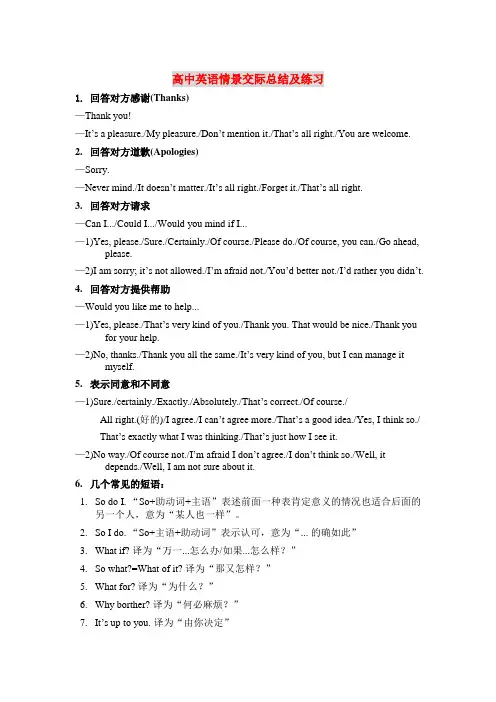
高中英语情景交际总结及练习1.回答对方感谢(Thanks)—Thank you!—It’s a pleasure./My pleasure./Don’t mention it./That’s all right./You are welcome. 2.回答对方道歉(Apologies)—Sorry.—Never mind./It doesn’t matter./It’s all right./Forget it./That’s all right.3.回答对方请求—Can I.../Could I.../Would you mind if I...—1)Yes, please./Sure./Certainly./Of course./Please do./Of course, you can./Go ahead, please.—2)I am sorry; it’s not allowed./I’m afraid not./You’d better not./I’d rather you didn’t.4.回答对方提供帮助—Would you like me to help...—1)Yes, please./That’s very kind of you./Thank you. That would be nice./Thank you for your help.—2)No, thanks./Thank you all the same./It’s very kind of you, but I can manage it myself.5.表示同意和不同意—1)Sure./certainly./Exactly./Absolutely./That’s correct./Of course./All right.(好的)/I agree./I can’t agree more./That’s a good idea./Yes, I think so./ That’s exactly what I was thinking./That’s just how I see it.—2)No way./Of course not./I’m afraid I don’t agree./I don’t think so./Well, it depends./Well, I am not sure about it.6.几个常见的短语:1.So do I. “So+助动词+主语”表述前面一种表肯定意义的情况也适合后面的另一个人,意为“某人也一样”。
高中英语情景交际总结及练习1.回答对方感谢(Thanks)—Thank you!—It’s a pleasure./My pleasure./Don’t mention it./That’s all right./You are welcome. 2.回答对方道歉(Apologies)—Sorry.—Never mind./It doesn’t matter./It’s all right./Forget it./That’s all right.3.回答对方请求—Can I.../Could I.../Would you mind if I...—1)Yes, please./Sure./Certainly./Of course./Please do./Of course, you can./Go ahead, please.—2)I am sorry; it’s not allowed./I’m afraid not./You’d better not./I’d rather you didn’t.4.回答对方提供帮助—Would you like me to help...—1)Yes, please./That’s very kind of you./Thank you. That would be nice./Thank you for your help.—2)No, thanks./Thank you all the same./It’s very kind of you, but I can manage it myself.5.表示同意和不同意—1)Sure./certainly./Exactly./Absolutely./That’s correct./Of course./All right.(好的)/I agree./I can’t agree more./That’s a good idea./Yes, I think so./ That’s exactly what I was thinking./That’s just how I see it.—2)No way./Of course not./I’m afraid I don’t agree./I don’t think so./Well, it depends./Well, I am not sure about it.6.几个常见的短语:1.So do I. “So+助动词+主语”表述前面一种表肯定意义的情况也适合后面的另一个人,意为“某人也一样”。
高中英语情景交际总结及练习1.回答对方感谢(Thanks)—Thank you!—It’s a pleasure./My pleasure./Don’t mention it./That’s all right./You are welcome. 2.回答对方道歉(Apologies)—Sorry.—Never mind./It doesn’t matter./It’s all right./Forget it./That’s all right.3.回答对方请求—Can I.../Could I.../Would you mind if I...—1)Yes, please./Sure./Certainly./Of course./Please do./Of course, you can./Go ahead, please.—2)I am sorry; it’s not allowed./I’m afraid not./You’d better not./I’d rather you didn’t.4.回答对方提供帮助—Would you like me to help...—1)Yes, please./That’s very kind of you./Thank you. That would be nice./Thank you for your help.—2)No, thanks./Thank you all the same./It’s very kind of you, but I can manage it myself.5.表示同意和不同意—1)Sure./certainly./Exactly./Absolutely./That’s correct./Of course./All right.(好的)/I agree./I can’t agree more./That’s a good idea./Yes, I think so./ That’s exactly what I was thinking./That’s just how I see it.—2)No way./Of course not./I’m afraid I don’t agree./I don’t think so./Well, it depends./Well, I am not sure about it.6.几个常见的短语:1.So do I. “So+助动词+主语”表述前面一种表肯定意义的情况也适合后面的另一个人,意为“某人也一样”。
高中英语情景交际单选题40题1. You look really tired. __________A. I'm fine, thanks.B. I stayed up late last night.C. That's too bad.D. Oh, no.答案:B。
本题考查日常交际中的回应。
A 选项“ I'm fine, thanks.”通常用于回答“How are you?”这样的询问身体状况的问题;C 选项“That's too bad.”用于对不好的事情表示遗憾;D 选项“Oh, no.”用于表示惊讶或否定。
而在“ You look really tired.”这个情境中,B 选项“ I stayed up late last night.”能合理地解释看起来疲倦的原因。
2. Thank you for helping me. __________A. Don't mention it.B. All right.C. That's right.D. No problem.答案:A。
当别人表示感谢时,A 选项“Don't mention it.”意思是“别客气,不用谢”,是常见的回应方式;B 选项“All right.”常用于表示同意或认可;C 选项“That's right.”意思是“那是对的”;D 选项“No problem.”也可表示“不客气”,但在这种正式感谢的情境中,“Don't mention it.”更显礼貌和正式。
3. I'm sorry I'm late. __________A. It doesn't matter.B. You're welcome.C. That's all right.D. Both A and C.答案:D。
A 选项“It doesn't matter.”和C 选项“That's all right.”都可以用来回应别人的道歉,表示“没关系”;B 选项“You're welcome.”用于回应感谢。
高中英语情景交际总结及练习1.回答对方感谢(Thanks)—Thank you!—It’s a pleasure./My pleasure./Don’t mention it./That’s all right./You are welcome. 2.回答对方道歉(Apologies)—Sorry.—Never mind./It doesn’t matter./It’s all right./Forget it./That’s all right.3.回答对方请求—Can I.../Could I.../Would you mind if I...—1)Yes, please./Sure./Certainly./Of course./Please do./Of course, you can./Go ahead, please.—2)I am sorry; it’s not allowed./I’m afraid not./You’d better not./I’d rather you didn’t.4.回答对方提供帮助—Would you like me to help...—1)Yes, please./That’s very kind of you./Thank you. That would be nice./Thank you for your help.—2)No, thanks./Thank you all the same./It’s very kind of you, but I can manage it myself.5.表示同意和不同意—1)Sure./certainly./Exactly./Absolutely./That’s correct./Of course./All right.(好的)/I agree./I can’t agree more./That’s a good idea./Yes, I think so./ That’s exactly what I was thinking./That’s just how I see it.—2)No way./Of course not./I’m afraid I don’t agree./I don’t think so./Well, it depends./Well, I am not sure about it.6.几个常见的短语:1.So do I. “So+助动词+主语”表述前面一种表肯定意义的情况也适合后面的另一个人,意为“某人也一样”。
高中英语情景交际总结及练习1.回答对方感谢(Thanks)—Thank you!—It’s a pleasure./My pleasure./Don’t mention it./That’s all right./You are welcome. 2.回答对方道歉(Apologies)—Sorry.—Never mind./It doesn’t matter./It’s all right./Forget it./That’s all right.3.回答对方请求—Can I.../Could I.../Would you mind if I...—1)Yes, please./Sure./Certainly./Of course./Please do./Of course, you can./Go ahead, please.—2)I am sorry; it’s not allowed./I’m afraid not./You’d better not./I’d rather you didn’t.4.回答对方提供帮助—Would you like me to help...—1)Yes, please./That’s very kind of you./Thank you. That would be nice./Thank you for your help.—2)No, thanks./Thank you all the same./It’s very kind of you, but I can manage it myself.5.表示同意和不同意—1)Sure./certainly./Exactly./Absolutely./That’s correct./Of course./All right.(好的)/I agree./I can’t agree more./That’s a good idea./Yes, I think so./ That’s exactly what I was thinking./That’s just how I see it.—2)No way./Of course not./I’m afraid I don’t agree./I don’t think so./Well, it depends./Well, I am not sure about it.6.几个常见的短语:1.So do I. “So+助动词+主语”表述前面一种表肯定意义的情况也适合后面的另一个人,意为“某人也一样”。
高中英语情景交际总结及练习1.回答对方感谢(Thanks)—Thank you!—It’s a pleasure./My pleasure./Don’t mention it./That’s all right./You are welcome. 2.回答对方道歉(Apologies)—Sorry.—Never mind./It doesn’t matter./It’s all right./Forget it./That’s all right.3.回答对方请求—Can I.../Could I.../Would you mind if I...—1)Yes, please./Sure./Certainly./Of course./Please do./Of course, you can./Go ahead, please.—2)I am sorry; it’s not allowed./I’m afraid not./You’d better not./I’d rather you didn’t.4.回答对方提供帮助—Would you like me to help...—1)Yes, please./That’s very kind of you./Thank you. That would be nice./Thank you for your help.—2)No, thanks./Thank you all the same./It’s very kind of you, but I can manage it myself.5.表示同意和不同意—1)Sure./certainly./Exactly./Absolutely./That’s correct./Of course./All right.(好的)/I agree./I can’t agree more./That’s a good idea./Yes, I think so./ That’s exactly what I was thinking./That’s just how I see it.—2)No way./Of course not./I’m afraid I don’t agree./I don’t think so./Well, it depends./Well, I am not sure about it.6.几个常见的短语:1.So do I. “So+助动词+主语”表述前面一种表肯定意义的情况也适合后面的另一个人,意为“某人也一样”。